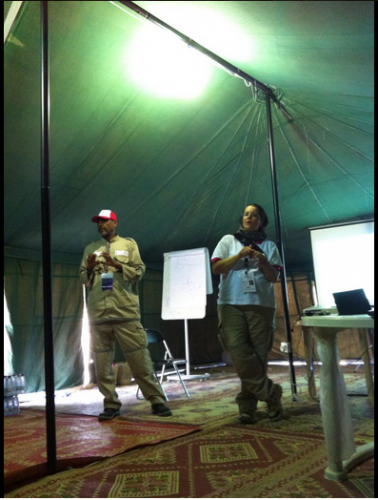What are some of the research opportunities in Humanitarian Innovation? What are some of the “bright spots” to advance technology (new or existing)? The Working Group for Emergency Telecommunications (WGET) – ICT Humanitarian Innovation Forum was held in Dubai on April 29 – 30, 2015. While I curated the session, I was unable to attend at the last minute. Colleagues Larissa Fast and Rakesh Bharania kindly lead the interactive workshop about Communicating with Affected Communities. The WGET audience is a mix of technology companies, humanitarians, researchers and governmental (INGO, NGO, national and international) experts. This unique forum provided a chance to really drive conversations across disciplines.
WGET Session Description
Disaster-affected communities are increasingly the source of the “Big Data” that gets generated during disasters. Making sense of this flash flood of information is proving an impossible challenge for traditional humanitarian organizations. What are the next generation needs for actionable research and software in the fields of Social Data, Predictives and New Technology for Humanitarian response, especially focused on communicating with communities? This session will highlight the lessons learned from the Field while engaging participants in small group feedback sessions. Participants will be asked to discuss key topics such as research needs, opportunities and barriers. Suggestions will be documented and serve as an output from the workshop.
ABOUT WGET
UN OCHA created this Storify: Unveiling Digital Aid at the 2015 WGET
Find the WGETForum on Twitter
See the WGET website
What are some of the opportunities, barriers and research needs to advance technology use for Humanitarian response?
Many of these answers are fairly common for any project: development and humanitarian. I am struck by the missing ‘step ladder’ to solutions. With the World Humanitarian Summit coming, will there be some technical meetings to brainstorm on ‘what does success look like’? Some of the work at Qatar Computing Research Institute, School of Data, Responsible Data Forum, Brck and various social entrepreneurs are tackling these issues. Are these tools and techniques reaching the right people?
I’ve taken the liberty to highlight the key points. The session format provided ‘headline’ topics. While these lists are missing some of the conversational context, it is our hope that it gives you a window into some of the knowledge shared. The next steps are truly up to all of us.
Some of the barriers cited for advancing use of technology include:
- How they can operate best where countries declare an emergency. When a country says it does not have an emergency, it prevents from responding.
- Lack of clear problem statement—lack of social data but we don’t know how more of it would solve a problem.
- Predictive models need to be adaptive to be effective, which increases complexity
- Funding, Costs
- Restrictive government policies
- Regulation/policy
- No coordination of efforts
- Trust (between organizations and people to organizations)
- Decision-making triggers/timelines
- Variety of platforms – trusted?
- Connectivity
- Disrupted networks in disasters, lack of real-time data
- Energy infrastructure, energy resources, energy/electricity competencies
- Duplication of efforts
- Veracity of information
- Risk of information to the organization
- Reliability of data
- Data protection,Data expiration
- Do we want to use social data? What’s the point?
- High noise-to-signal ratio
- No one person(s) who across all organizations is collecting data and knowledge of all going on
- Knowing information gaps and what is being collected and not
Opportunities in research and advancing technology:
- Everyone is trying to solve this problem… need a forum where we can share
- Financing mechanisms based on predictive data/forecast
- Social media; good platform if we are able to use it properly.
- Provide insight into an issue
- Create awareness
- Feedback mechanisms to better adapt humanitarian response to needs
- Integration of public social media awareness for self-filtering (?) into preparedness campaigns
- Move towards demand-driven assistance, especially in acute phase of relief
- How can we evaluate effectiveness of our interventions.
- Enhance decision-making
- Mechanism/triggers for decisions
- Common tools, analysis to collect intelligence from a variety of platforms
- Base applications on HXL so that they can be aggregated (?), exchanged, consolidated
- Share initiatives – communicate to all others so no duplication and extra effort
- Crisis signal – see areas with coverage of phones etc. Provides useful info
- To use the new social related applications which we are well known to send live videos of cases that required immediate action (e.g., Snapchat)
- Using the UAVs to send live videos to people in charge of the humanitarian response
- Pooling/sharing resources, risk, skills/analysis
- Provide through experiments
- Narrative to show need/value, lives saved/lost (feedback (positive/negative)
- Provision better programmes by reacting to real time data
- Evaluating effectiveness of our interventions real time
Some Brainstormed ideas:
- Research: study on impact of tech on community resilience (net effect)
- Create a humanitarian open-source community to develop tools based on social data
- Accountability of quality
- Insecurity of shared information
- Escalation of information
- Adaptive, real-time predictive models
- Integrated social media filters for preparedness programs
- ICT tech: problem statement, expertise in house (analysis, security), + tools
- Data transfer agreement
- Clearing and monitoring mechanisms for social data to make it trustworthy
- Keep in mind the ethical considerations of ICT use in humanitarian
- To allow models/analysis and define the way data can be used across agencies or specifically across the cluster
********

